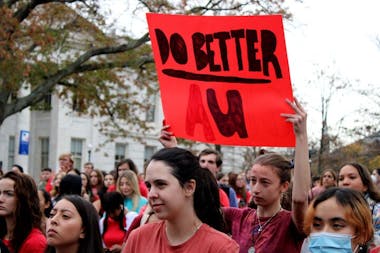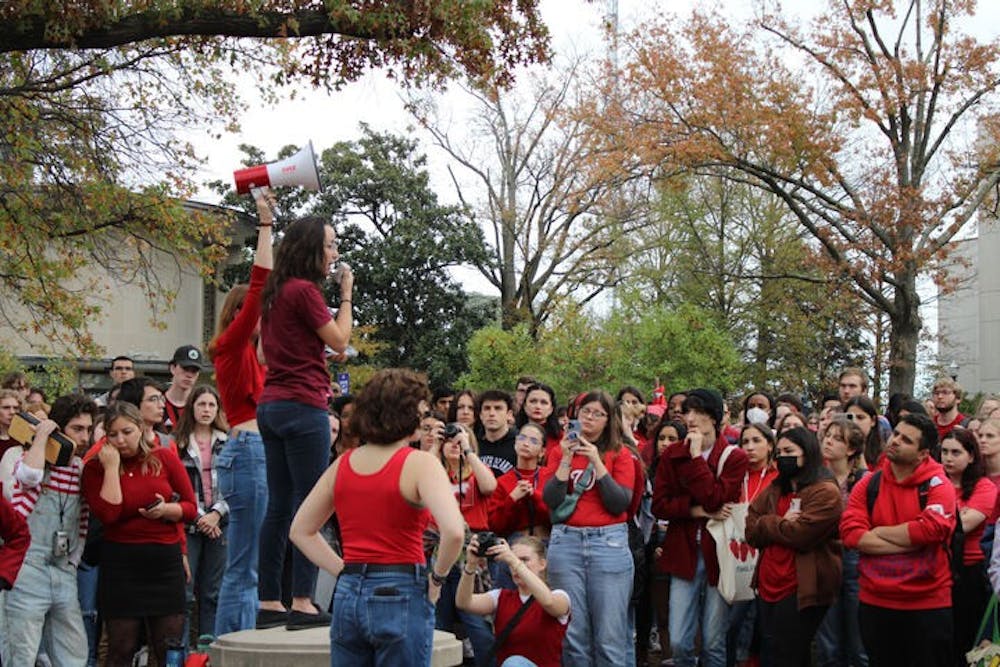From the Newsstands: This story appeared in The Eagle's April 2023 print edition. You can find the digital version here.
American University is considered one of the most politically active college campuses in the country, according to a study by The Princeton Review. However, some students feel that political activism on campus overlooks underprivileged and marginalized voices.
Many say that the perspectives of students of color, faith-based communities and immigrants can be excluded and overshadowed by groups with more privilege.
“Personally, I've seen that a lot of the time it's the majority group speaking for minority groups,” said Alina Hasan, a sophomore in the College of Arts and Sciences and a member of the Muslim Student Association’s advocacy team.
When it comes to intersectional issues, some students say that the University’s response falls short or does not appear at all. Representatives from both the Asian American Student Union and Korean Student Association participated in a vigil held to honor victims of the Monterey Park and Half Moon Bay shootings.
“I think one thing we drew from it is that from the AU administration, we don’t get that much support,” Lilla Khan, a sophomore in the School of International Service and the vice president of AASU, said. “To this day, I think [the] AU administration was still very silent about the fact that these shootings happened and it was pretty overlooked.”
The University sent an email to students from the affected areas in California following the shootings, but did not send out a University-wide announcement.
“It was just basically silence,” Adrienne Yeh, a senior in SIS and the co-president of KSA, said. “It’s kind of like they handpick certain instances they want to highlight.”
The Muslim Student Association is another organization that actively participates in social activism on and off campus. The organization recently raised approximately $4,000 for victims of the earthquakes in Turkey and Syria. Members also protested the treatment and genocide of Uyghur Muslims in China on Capitol Hill.
“I have a lot of interest in understanding the differences even within the Muslim community, across sex, across races, across ethnicities, across immigration,” Taha Vahanvaty, a freshman in the School of Public Affairs and a discussion facilitator for MSA, said. “Spearheading and focusing on dialogue across those lines of difference within the Muslim community is something that I hope on incorporating within the larger discussion circles.”
Vahanvaty said he feels that immigrant and faith-based communities are often excluded in discussions around diversity, equity and inclusion and overlooked in political activism on campus. International students make up 10.8 percent of the student body, according to the 2022-23 Academic Data Reference Book.
“I think the venn diagram of [diversity, equity and inclusion] and activism very closely overlaps, but oftentimes it's thought of in terms of gender or race or socioeconomic status,” Vahanvaty said. “And faith has kind of been one of those things that you keep at home. Like you practice what you believe, you can do whatever you want, but you do that in your own room.”
Vahanvaty added that first-generation immigrant students who come from more conservative communities can be excluded in political activism on a campus known for its liberal reputation.
Some students said they feel minority students’ experiences and voices are often co-opted by more privileged groups on campus. Hasan said she experiences this in the classroom when non-Muslim students try to speak on behalf of Muslim women in Iran. She gave the Black Lives Matter movement as another example.
“We would want that affluent group to stand with those groups of people rather than standing up for them and speaking for them because you can't really speak on a struggle until you've actually experienced it yourself,” Hasan said.
John Paul Mejia, a sophomore in CAS and the campaign manager for the AU Sunrise Movement’s Green New Deal, said he feels that political movements on campus can be susceptible to whitewashing.
“When we don't articulate demands in social movements and say explicitly what we want and who we're targeting, we leave a conversation open to those who often make decisions and those who often are closer to power to co-opt what that conversation may be and therefore also claim what victory is,” Mejia said.
Vahanvaty said although some students from marginalized communities are excluded in activism, he thinks AU students are aware that they need to include more student voices from different backgrounds. However, Vahanvaty said he feels “jaded” by student activism.
“The activism I've seen on campus has a lot of intentionality, but I personally don't see a lot of impact,” Vahanvaty said.
Some students say that despite the University's high ranking when it comes to political activity, the activism on campus feels performative, with the words often not translating into actions.
“I think there’s also a sort of big culture at AU that ... [kind of] become performative, where people say that they’re interested in progressive causes, but then aren’t actually doing anything to advance those causes,” Pine said.

Many students said they feel similarly and said the University administration has not done enough in response to recent protests. Mejia cited the staff and graduate student union strike in fall 2022 as an outlier and praised the movement’s organizational and strategic skills.
“What I fear of other forms of activism or movements on campus is that they can be easily defanged by meaningless structures or working groups that can be provided for the administration, which may not offer enough accountability for that to be a victory that the movement can claim,” Mejia said.
According to Hasan, activism on campus only goes so far and the University itself needs to prioritize having a diversity of voices in order to effectively respond to students.
“Protesting helps, but people that are within the administration should also be working to bring about change,” Hasan said. “I feel like if you want diverse voices to be heard, you need to put those diverse voices in power, and I feel like we don't see a lot of that on campus.”
Given AU’s politically active reputation, students find themselves dismayed about what they feel is a lack of tangible movement from the student body when it comes to activism and advocacy.
“I think at AU we might think of it as people are really politically involved, but I always ask, like, what does that mean?” Eli Pine, a senior in CAS and vice president of the Claudia Jones Club, said. “What politics are they involved in? Is it just an internship on the Hill or are they getting out into the community and doing real power-building?”





